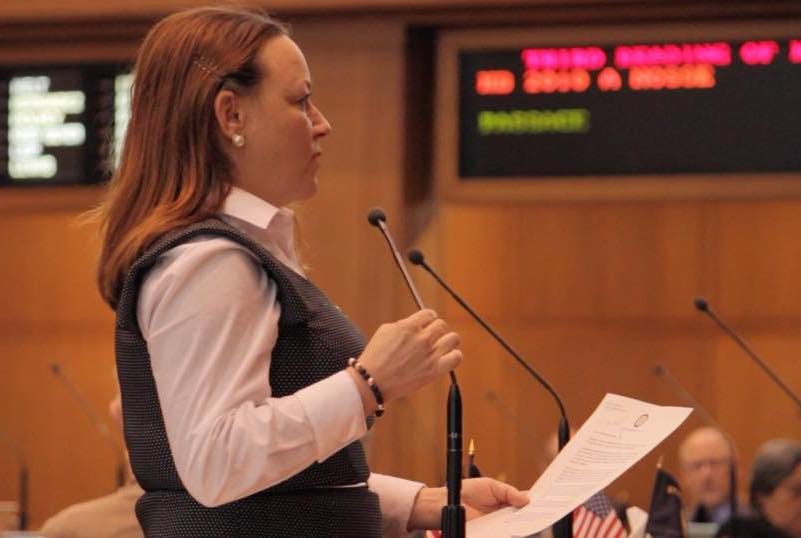Rep. Rachel Prusak: Oregon has chosen not to invest in a diverse legislature. It should.
Oregon's legislature is not as representative or effective as it could be. Prusak says the reason she decided not to run for re-election, an unlivable salary, is also keeping many from running at all.

“Today, it is with deep sadness and profound love for our state and communities, that we announce our decision to not run for re-election.” I wrote these words alongside my legislative colleagues Karin Power and Anna Williams on February 28th, 2022. The Oregon Legislature is considered a “citizen legislature,” and all three of us believed in, and tried to continue within, that system.
But what is supposed to be a citizen legislature has historically been a legislature of wealthy or retired applicants. The reality is that most Oregonians cannot afford to even consider the idea of running for office. The current structure ensures a power imbalance and excludes candidates who are talented and passionate but cannot survive on a legislator’s salary.
In both my private and professional life, I see the struggles that families face. This convinced me to run for office. Over the past several years, I’ve met with thousands of Oregonians and have been deeply honored to be trusted with their stories, struggles, and successes. I have proudly championed public health policies, including equitable access to physical and behavioral healthcare, gun violence prevention, and policies to support frontline healthcare workers during the pandemic. Throughout my legislative career, I have also continued to see patients. These dual roles as elected leader and healthcare provider took a toll. Like many Oregonians trying to make ends meet with two jobs, I faced exhaustion and burnout.
Many Oregonians are unaware that state lawmakers make a base salary of less than $33,000 per year. While the work of the Oregon Legislature was once part-time, it is not anymore. It has become a full-time role for anyone who wants to get it right, yet it is impossible to invest the time needed to do the job correctly when we are not earning a livable wage. In addition to attending long and short legislative sessions, we meet for quarterly legislative committee days and special sessions. We are appointed to task forces and work groups that oversee critical policy work. We spend time assisting constituents, studying, and learning about government and state issues, working with agencies and advocates. Add in campaigning and fundraising every two years and we have two full jobs in addition to our professional ones.
How much of a check on power can we be if we earn a base salary of less than $33,000 a year? How can we adequately oversee a state budget of more than $25 billion, with dozens of different state agencies? Investing in people is a smart long-term decision and one Oregon has been reluctant to make. This is an issue playing out across the country right now.
A system built for the financially well-off or the retired will never work for all its citizens. Though Oregon has elected a historic number of diverse lawmakers over the last few years, we have not changed the underlying systems that will inevitably push them out. Between unlimited campaign contributions, no movement on campaign finance reform, and low legislative pay, we continue to perpetuate systems that leave young, Black, Indigenous, Latinx, women, and LGBTQ+ legislators behind.
The lived experiences of political candidates should reflect the lives of their constituents, but many talented and passionate people throughout the state cannot afford to even consider public service. Nobody should get rich as a lawmaker. It’s both a public service and an honor. Paying a fair wage simply ensures a more democratic pool of people who run for legislative positions.
While we may not have succeeded this year in passing a livable legislative wage, I’m proud of our efforts on behalf of those with whom we serve and those who will come after us. I'm sad to leave. Still, I hope my fellow and future legislators will eventually choose to pay lawmakers what they are worth, so we can recruit people of varied backgrounds and life experiences to serve our state. The people of Oregon have countless unique perspectives, and as many of those perspectives as possible should have a voice in our state legislature.





Citizen legislature. The legislators themselves have made things difficult. They introduce too many bills they no will do nothing but create paper, they creat committees for everything, and especially the Democrats keep growing unnecessary government. Start by slashing the number of days in a session and reduce the number of allowable bills.
Yep. I could only afford to do it because I serve in the Reserves and my wife has a good salary. I'm happy I got to spend 4 years working with Rep. Prusak, Power, and Williams. I just wish more people could have the opportunity.